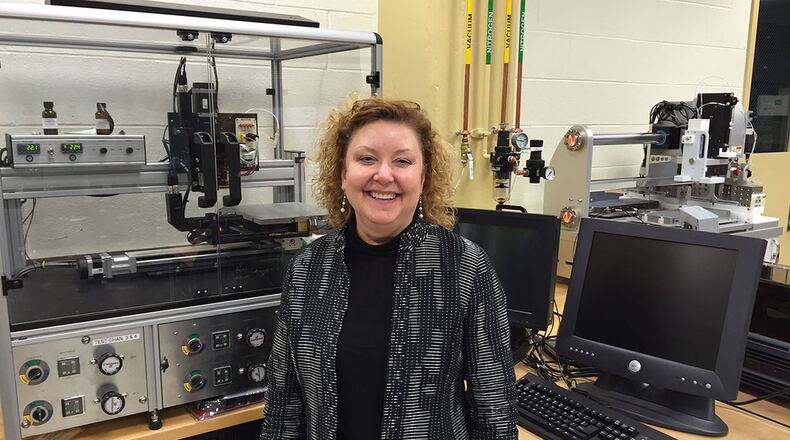Thorp passed away in July 2018, just one day after receiving a phone call about winning the award. She battled cancer for more than two decades, but Thorp’s career flourished. She worked for the Air Force for 26 years, most recently serving as a research leader for the Air Force Research Laboratory Materials & Manufacturing Directorate at Wright-Patterson Air Force Base.
Thorp’s passion for science, engineering and community service guided her journey in life. She was an accomplished researcher and leader.
“Katie focused on enjoying life and helping others,” said Dr. Jennifer Fielding, her longtime friend and colleague.
While the diagnosis came during her early adulthood, Thorp did not let it define her path in life.
“She never dwelled on it or complained about it,” Fielding said. “She was often more concerned about how people felt and how other people were doing rather than her own illness. Katie was a very open and caring person.”
Fielding first met Thorp 15 years ago and described as “an amazing supervisor” and a “phenomenal role model.”
“She wanted to bring out the best in [people] and she really did that,” said Fielding, who is now a section chief herself.
Thorp began her career as a materials research engineer, focusing on high-temperature organic matrix composites. She earned her doctorate in materials engineering and discovered the chemistry of a groundbreaking material for the aerospace industry. Today, this material is useful for propulsion and structural applications and has led to reduced weight and increased performance in key Air Force platforms, including the F-35 Joint Strike Fighter and the B-2 Stealth Bomber.
Following her research, Thorp excelled in various leadership and supervisory roles, including team lead, section chief, program manager and branch chief.
Dr. Tim Bunning, AFRL’s acting chief technologist, who worked closely with her for years, said he admired her positive outlook and her teambuilding skills.
“She was truly the sort of branch chief you wanted,” Bunning said. “Katie came in with passion and energy, and she truly took the time to find out what made her [team members] tick.”
He added, “People were just naturally drawn to her. She had an uncanny knack for connecting with people.”
Over the years, Thorp’s cancer went into remission, but it returned and eventually spread to her bones.
Bunning said, “Everyone’s heart sunk” when they learned the cancer was back.
Even though she endured surgery, radiation and other treatments, Thorp forged on professionally and personally.
“Outwardly, you would never know that she was going through this,” Bunning said.
She executed programs, guided research and development investment portfolios, and led research teams. Along the way, Thorp mentored fellow engineers, served in professional societies, advocated for STEM (science, technology, engineering and math) education in area schools and was an active member in her church.
Dr. Timothy Pruyn, a member of the research team Thorp led, recalled her ability to put people at ease. He said that her calm demeanor made everyone feel comfortable to speak up and ask questions.
“She was brilliant and very encouraging of others’ abilities,” Pruyn said. “She naturally inspired her team members to do their very best work.”
Amber Davis, an AFRL deputy division chief, echoed this sentiment.
“Katie was very much a team-centric person,” Davis said. “She was very inclusive of people.”
Thorp’s focus on helping others stretched from her professional life to her community. After learning how to strengthen her immune system using whole foods nutrition, she shared recipes with the Noble Circle, a nonprofit group that supports women facing cancer.
In addition to her career and community involvement, Thorp was married and enjoyed a close relationship with her extended family and large group of friends.
Longtime friend and colleague Dr. Karla Strong delivered the eulogy at Thorp’s funeral. She said that Thorp will be remembered as a “kind person” and a really “great friend.” Strong described her as “fun but also very wise.”
She explained that, “When Katie was mentoring, she did not just tell [people] what to do.” Instead, she “listened and helped [them] find the best path forward.
“Katie never judged others; she just accepted people,” Strong said.
Bunning described Katie as a “bright light” and said people “couldn’t help but smile when [they] were around her. She just radiated positive energy,” he said.
“Within AFRL, she has a ‘huge fan base,’” Fielding said in describing the many colleagues who knew and loved Thorp.
Fielding realized the remarkable extent of Thorp’s impact when she relayed news from the Thorp family to her work colleagues.
“So many people emailed me very heartfelt, long, detailed messages about how Katie impacted their lives,” she said. “Katie was a mentor and a friend to so many people.”
Davis said that she is grateful for the time she spent working with Thorp. Even today, she often thinks, “What would Katie do?” and then recalls the thoughtful way in which Thorp approached difficult situations.
“Katie always put a lot of thought into everything,” she said. “She reached out and took into consideration multiple people’s opinions.”
Davis said that the PRISM award is a meaningful way to honor Thorp because [SWE’s mission] of empowering women is “something in which she truly believed and supported.”
About the Author
